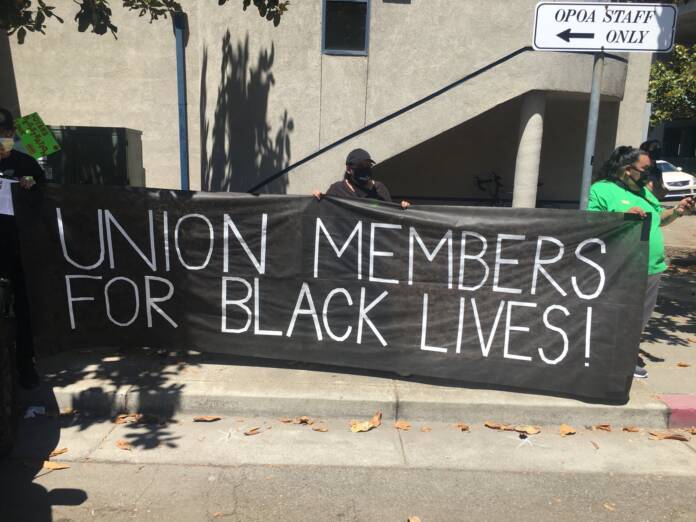A group of about 150 demonstrators representing several Bay Area labor unions gathered outside the Oakland Police Officers Association headquarters on Wednesday, endorsing calls to defund the police and urging Police Officers Associations across the country to embrace reforms. Some in attendance shared personal experiences of discrimination and unnecessary use of force by police officers.
“My brother was pushed to the ground. They accused us of jaywalking, but we were in the crosswalk,” James Spencer, a member of SEIU United Western Workers, told the crowd, about an encounter with the Oakland police.
The protesters demanded that 50% of the Oakland Police Department’s $330 million budget be diverted towards community resources for Black Americans. The coalition of unions making the demand represents more than 100,000 California janitors, teachers, hotel workers, security officers and others. Organizations including East Bay Alliance for a Sustainable Economy, San Francisco Jobs with Justice, and the Coalition of Black Trade Unionists joined in.
The demonstrators also insisted that that Police Officers Associations embrace calls for defunding and reform or be expelled from local, state, and national labor federations—a hot-button topic that the overarching AFL-CIO has yet to fully address.
SEIU Western Workers Director Sanjay Garla believes it’s very important to divert funds away from the police department and to put them towards humanitarian solutions, to better the quality of life for his union’s members.
“We represent workers in low wage industries, especially African American people. When we talk to our members, their stories are shocking… We as a union are coming out to say that police are not the answer, that we need to move resources to thinks that people need, like healthcare, housing, and jobs,” said Garla.
Garla said that as the director of SEIU WW, he is especially concerned about his union’s members being profiled and harassed by police during traffic stops.
“If I have a hardworking union member telling me that they are being pulled over every day, there’s a clear problem,” said Garla.
#oakland unions picketing the Oakland POA (Cop Union). SEIU, AFCSME, IWW, ILWU, CBTU pic.twitter.com/6bOjZ8nUhq
— ok satan (@lesuperburp) June 17, 2020
Indeed, some of those present had experiences being profiled and harassed by police during traffic stops. Cat Bedford, a member of the union AFSCME 3299, the University of California’s largest employee union, described how she has been routinely pulled over by police.
“I used to get pulled over every day, at the same time, to the point that they were shining a light in the backseat at my son and asked him for his ID… he told me ‘I’m scared to death,'” said Bestford.
Bestford also told demonstrators about her fear of being killed by police—despite being a woman, she feels that being Black increases her risk of being profiled.
“I thought I was exempt until Breonna Taylor, Sandra Bland, they tell me different. It’s not my gender that saves me, it’s the color of my skin that targets me,” said Bestford.
Bestford joined others in calling for sharp reductions in police funding, saying that the Oakland Police Department’s swollen budget is being used to purchase weapons to harm protestors and the Black community. For that reason, Bestford claimed that OPD cannot be deemed a part of the labor movement, or be unionized, because they do not stand in solidarity with marginalized groups.
Schuyler Laparle, head steward of UAW 2865, the UC Berkeley student worker’s union, agreed that the police should not be considered a labor group, and should be de-unionized.
“They don’t represent the principles of the labor movement, which is to uplift systemically oppressed workers, they have worked to gain power over them and take funding away from the labor movement,” said Laparle.
Union protest in #Oakland against Oakland POA (cop union). SEIU, AFSCME, OEA, ILWU, CBTU present. pic.twitter.com/QyA6Rb4Nvm
— ok satan (@lesuperburp) June 17, 2020
Laparle explained that on UC campuses, people of color are regularly subject to profiling and discrimination by police. One example was when two Black children, one of whom was the 11 year-old son of a UCB student, were on a playground in the University Village when they spotted a woman taking pictures of them.
They quickly called the police. When police arrived, the woman claimed that the children had stolen her purse, and police handcuffed them both, detaining them in the back of their car despite having “no evidence” that any theft had taken place, according to Laparle. The purse was found later that day and returned to the woman.
“Black children call the police, and they end up getting handcuffed. This is clearly racialized police brutality,” said Laparle.
Laparle said that it the movement to defund police is highly relevant to student workers in the UC system, as the University of California is not racially representative of California’s population, showing entrenched segregation stemming from underfunded public education, which could be ameliorated by diverting police funding.
“As a student worker, I am a part of higher education, which is one of the most segregated workplaces in the country. California’s population is 7% African American, UCB has 3%. That’s just not representative. What that stems from is… lack of quality education, and a really important part of that is defunding the police and refunding education,” said Laparle.






